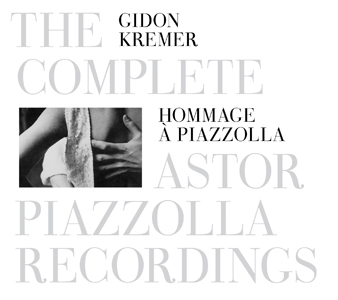Gidon Kremer’s Hommage à Piazzolla: The Complete Astor Piazzolla Recordings is out now. The eight-disc box set brings Kremer’s six previously released recordings of the Argentine composer’s music together for the first time, including four Nonesuch releases and two that were released by Teldec. The set’s seventh album, which is being released for the first time, features a 14-song live recording from the CBC’s Glenn Gould Studio from 1997.
Today marks the Nonesuch Records release of violinist Gidon Kremer’s Hommage à Piazzolla: The Complete Astor Piazzolla Recordings. The eight-disc box set brings Kremer’s six previously released recordings of the Argentine composer’s music together for the first time, including four Nonesuch releases—Hommage à Piazzolla (1996), El Tango (1997), Eight Seasons (2000), and Tracing Astor (2001)—and two that were released by Teldec—the opera María de Buenos Aires (1998, two CDs) and Tango Ballet (1999). The set’s seventh album, which is being released for the first time, features a 14-song live recording from the CBC’s Glenn Gould Studio from 1997; composer and fellow Argentine Osvaldo Golijov has written liner notes for this new disc.
The box set is now available in the Nonesuch Store, as is Kremer’s new album with his Kremerata Baltica ensemble, The Art of Instrumentation: Homage to Glenn Gould, released earlier this fall. Now through the holidays, both are 34% off the suggested retail price—that's almost 20% off the already reduced price listed on the site—as part of the Nonesuch Store's anniversary sale; the final discount is shown at checkout.
Composer, arranger, and bandoneón virtuoso Astor Piazzolla (1921–1992) was inspired by American jazz and concert music to revolutionize the Argentine tango in the years after World War II. “For me,” he once said, “tango was always for the ear rather than the feet.” His “nuevo tango,” with its intense melancholy and harmonic and rhythmic innovations, enraged traditionalists but became influential among musicians and fans around the globe.
Upon their release, the classical violinist Kremer’s recordings of Piazzolla’s work (which was thought of as “popular” music) were critically acclaimed, with Hommage à Piazzolla achieving pop sales levels in many countries, and concerts by Kremer and his tango ensemble selling out around the world. USA Today said, “Latin melancholy meets [Latvian] violinist Gidon Kremer’s restless, nervous temperament and wiry tone, giving the music an extra psychological tension, as well as some eccentric flights of improvisation. Wonderfully haunting,” and the Philadelphia Inquirer said, “Kremer … has a temperament as sweetly adventurous as a child’s and at times as doleful. Doleful is the word for much of this accomplished if whimsically arranged music. Doleful, earnest and fascinatingly performed.” Guest musicians in these recordings include Caetano Veloso, Milva, Horacio Ferrer, Julia Zenko, Jairo, the Astor Quartet, and Kremerata Baltica.
Kremer says of Piazzolla, whose work he has championed for nearly two decades: “You can sense through his music an experience that makes you at the same time joyful and sad. And saying these two words, ‘joyful’ and ‘sad,’ I could say as well that the striking combination of two extreme emotions go together like they go in Franz Schubert’s music, in Astor’s music. I know very few composers where you can feel it in such a passionate way.”
Composer John Adams, in his liner notes for Kremer’s first record of the Argentine’s work, said that Piazzolla’s “harmonic sequences have a sense of inevitability in the way they pull inexorably toward the cadence, and it is the core of Piazzolla’s art to arrange—or try to postpone—these arrivals in the most wrenchingly bittersweet of ways. It is as much as saying that you have finally arrived home, but home is no longer the same. Your house has been razed, and strangers now live in the neighborhood where you once played as a child.”
- Log in to post comments



